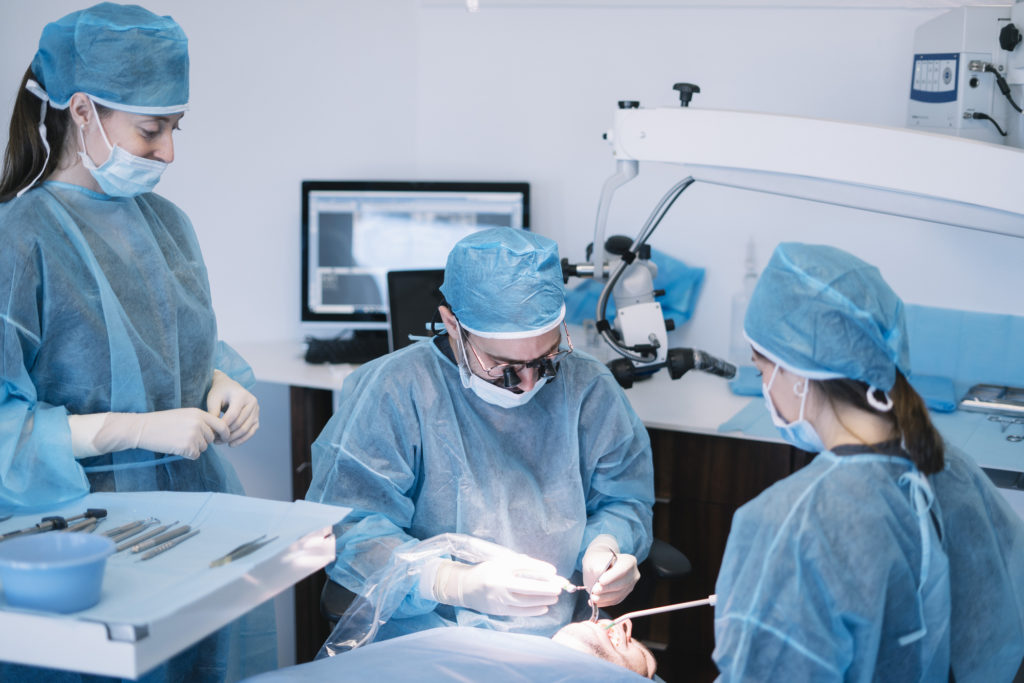A Quick Guide to the Different Types of Oral Surgery Procedures
Many people find dental appointments intimidating. According to one report, nearly a third of U.S. adults haven’t seen their dentist in at least a year. Many reasons can cause patients to feel unease about upcoming check-ups or needed surgeries.
One way to eliminate feelings of unease is to learn a few details about what procedure it is you’re going in for. Armed with the knowledge of your dentist or surgeon’s capabilities, you can go into surgery feeling safe and cared for.
Oral surgery doesn’t have to be intimidating when you look at it through the lens that your oral health is getting the care it needs. Preparing for oral surgery can start here! In this handy oral surgery guide, we’ll explore a few different types of oral surgery procedures and why they’re needed for good oral health.
Removal of Wisdom Teeth
Not everyone has a full set of their third molars, more commonly known as wisdom teeth. Your third molars typically start to come in during your teen years, but some do experience their wisdom teeth coming in later in life.
Generally, the mouth only has room for 28 teeth. When wisdom teeth start to come in, they tend to crowd the mouth. This can lead to tooth pain, tooth impaction, and oral infections. Having them removed is a common oral surgery procedure to avoid any further complications.
Oral surgery to get them removed includes local anesthetic and a recovery period of a few days with some discomfort. Depending on your teeth, the surgery itself can be done in-office at your local dentist. For more serious cases, your dentist will recommend you see an oral surgeon for more comfortable sedation during the procedure.
Dental Implants
On the opposite end of tooth removal are dental implants to replace missing teeth. Dental implants are a common oral surgery procedure completed as a way to replace tooth loss as a result of injury, periodontal disease, or general decay.
Replacing your natural teeth is a fairly extensive process as the procedure is meant to mimic the root of a tooth. This procedure is helpful for several reasons, including:
- Improvements in oral health
- Improvements in speech and appearance
- Eliminates discomfort
- Durable and convenient
Your dentist will provide an individualized plan for treatment to address your specific needs. The procedure itself involves a titanium implant being placed into the socket of the missing tooth. At this point, the implant needs time to bond to your jawbone. After which, an abutment gets attached to the titanium implant, which will securely hold your new tooth.
Your dentist will make impressions and model your bite, after which your replacement tooth will be attached to the abutment. Your replacement tooth should look and feel just like a natural tooth!
Treatment for Sleep Apnea
A less commonly known type of oral surgery deals with the treatment of sleep apnea. Per one statistic, there are 30 million people currently dealing with sleep apnea in the U.S. Sleep apnea dangerously blocks the flow of oxygen while sleeping.
Oral surgery options do exist to help treat this condition and reintroduce the proper flow of oxygen through the body during sleep. Surgery options available can help with altering the jaw, palate, or upper airway structures.
One procedure, known as uvulopalatopharyngoplasty, deals with removing soft palate and throat tissue. This procedure can also be completed in tandem with soft palate implants and tongue advancement all to reintroduce proper breathing techniques during sleep.
The most invasive procedure option includes moving the upper and lower jaw to open the airway and facilitate better breathing.
Apicoectomy
Apicoectomies are endodontic procedures that take place when root canals are no longer a viable option. The name sounds more daunting than it is, as apicoectomies are considered minor procedures. Adults and children alike can receive this treatment to save a tooth.
During this procedure, the end of the root gets removed as well as any gum tissue that has become inflamed. Your tooth stays in place while this happens. These get completed when root canals are not a feasible option due to hooked roots at the bottom of a tooth.
The tip of the root gets removed during an apicoectomy and filled with inert material.
Recovering From Oral Surgery
A good recovery period is critical after having oral surgery. The recovery period is when you give your body a chance to heal and make sure the desired outcome discussed with your dentist and surgeon remains successful.
Take care of yourself and your mouth post-surgery to ensure a smooth recovery. A few things you can do to ease your pain and avoid any potential infections:
- Be sure to get plenty of rest
- Don’t ignore post-surgery instructions from your dentist
- Regularly ice the area if needed
- Utilize folded gauze to block any bleeding
- Avoid hot drinks and foods
- Avoid eating chewy or tough foods
- Keep an eye out for infections or swelling
- Use over-the-counter medication to alleviate pain
- Attend your follow-up appointments
For Your Oral Surgery Needs…
No matter which procedure it is, having oral surgery completed can significantly improve the health of your teeth and mouth. Hopefully, we’ve answered a few of your ‘what is oral surgery?’ questions so that you feel comfortable next time you go in for surgery.
Here at the Santa Monica Center for Oral Surgery & Dental Implants, we’re committed to providing a positive experience for you to feel comfortable while you get the care you need.
Feel free to book your next exam with us today! We provide a multitude of procedures for our patients that will help your teeth feel better and look better in no time.



